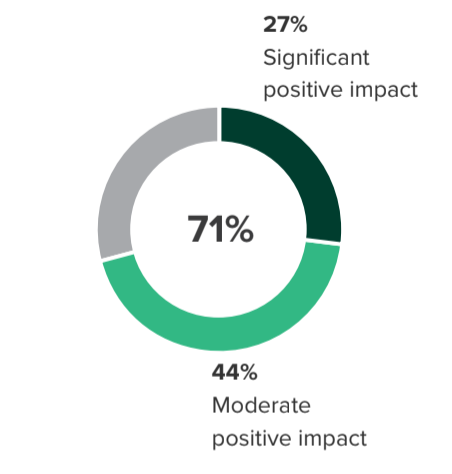The TikTok Search Revolution: How Gen Z is Transforming Online Discovery
The Localized Marketing Imperative: A Breakdown of Forrester’s Recent Study for Multi-Location Businesses
In March of this year, SOCi commissioned Forrester Consulting to evaluate the state of localized marketing today. This study, “The Localized Marketing Imperative: How Multi-Location Businesses Can Harness the Power of Local,” includes findings from a survey conducted by Forrester Consulting that was sent to 154 multi-location marketing leaders that are involved with managing their firms’ brand at the local level.
Throughout this blog, we’ll take you through the key findings of the study, and provide tangible examples of how you can use the data to improve your business’s localized marketing efforts. The study found that decision-makers appreciate localized marketing’s value, but few have realized its full potential.
Obstacles that Stifle Localized Marketing Ambitions
While every multi-location marketer would choose to have a strong localized marketing strategy for their business, this is not always the case. There are a lot of obstacles that can prevent businesses from getting their localized marketing efforts up to standard, or beyond. If you’re aware of the obstacles that your business could face when it comes to localized marketing, the more likely you are to be able to overcome them.
Some of the most common obstacles multi-location marketers encounter include:
- A lack of location-specific insight
- Difficulty balancing local and national needs
- Organizational silos
- Insufficient resources to scale localized marketing
If your multi-location business is facing any of these struggles, you’re not alone. The first step in improving your localized marketing efforts is to recognize areas that could be improved. In fact, data from the study found that improving marketing effectiveness at the local store level is a high or critical priority for 61 percent of multi-location leaders over the next 12 months.
How to Attain Success Through Localized Marketing
While there isn’t a one size fits all outline for achieving success, data from the study found that there were specific tactics that helped improve localized marketing for multi-location marketers across the board. The survey asked respondents what actions they could take to improve their localized marketing efforts, and the single most impactful tactic listed was to clearly define localized marketing responsibilities for corporate/national and local teams.
To achieve organization at both the corporate and local level, multi-location businesses must choose from three different organizational models outlined in the study:
- Primarily centralized: In this model, corporate marketing owns all or most of both local and national marketing including the planning, creation, execution, measurement, and optimization efforts.
- Primarily decentralized: In this model, individual locations own all or most of the local marketing strategy. While this approach is likely to result in a strong local presence, there is a greater chance for misalignment with the corporate marketing strategy and overarching business goals.
- Hybrid: The hybrid model is as you would expect, a combination of the two mentioned above. It requires seamless coordination and sharing across corporate and local owners made possible with the right technology. Respondents agree: The hybrid model is ideal for optimizing local content while preserving company-wide consistency.

Is your multi-location business currently utilizing the hybrid model, or are you leaning more towards the centralized or decentralized model? As you can see in the graph above, a hybrid approach to the management of a localized marketing program is best suited for multi-location marketing success. Therefore, it’s worth taking an in-depth look at how the hybrid model could further propel your localized marketing strategy to the next level.
How Comprehensive Technology Platforms Can Help
If your multi-location business is not yet using the hybrid model mentioned above, it’s time to consider a comprehensive technology platform for your marketing efforts. Technology platforms have proven to be effective when it comes to localized marketing. In fact, 71percent of those who have a solution that can aggregate and manage all localized content across locations and sites report a positive impact on their localized marketing efforts as a result.

When asking respondents what mattered most when looking for a comprehensive technology platform, the following areas were mentioned most frequently:
- Set and manage service-level agreements (SLAs) around response times and post frequency.
- Claim and manage local (non-owned) search pages.
- Measure local marketing effectiveness.
While these capabilities are useful in their own right, their value is enhanced when they live under the hood of one solution. This is something to keep in mind when your multi-location business begins to look for a platform if you are not utilizing one already.
How to Get Started Improving Your Localized Marketing Strategy
Now that you know the pain points when it comes to localized marketing and have learned how to attain success, it’s time to get started. A localized marketing strategy can unlock tremendous business and customer value for those brands that tackle it effectively. When planning your next move regarding your localized marketing strategy, make sure to clearly define your localized marketing responsibilities, identify and close capability gaps, use local customer interactions as an opportunity to improve your customer experience, and educate and support your stakeholders.
If you follow these guidelines, you should be on your way to a winning localized marketing strategy. For a more in-depth look at the study, download it here. If you’re looking for more ways to strengthen your localized marketing efforts after reading the resource, SOCi is here to help! SOCi is central command for multi-location businesses, which empowers you to manage search, social, ads, reviews, and more, all from a centralized platform with a single login. Request a demo today to learn more!





